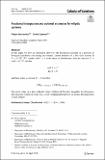Fractional integration and optimal estimates for elliptic systems
Author(s)
Hernandez, Felipe; Spector, Daniel
Download526_2024_Article_2722.pdf (455.7Kb)
Publisher with Creative Commons License
Publisher with Creative Commons License
Creative Commons Attribution
Terms of use
Metadata
Show full item recordAbstract
In this paper we give an affirmative answer to the Euclidean analogue of a question of Bourgain and Brezis concerning the optimal Lorentz estimate for a Div–Curl system: If
$$F \in L^1(\mathbb {R}^3;\mathbb {R}^3)$$
F
∈
L
1
(
R
3
;
R
3
)
satisfies
$$\text {div}F=0$$
div
F
=
0
in the sense of distributions, then the function
$$Z=\text {curl} (-\Delta )^{-1} F$$
Z
=
curl
(
-
Δ
)
-
1
F
satisfies
$$\begin{aligned} \text {curl } Z&= F \\ \text {div } Z&= 0 \end{aligned}$$
curl
Z
=
F
div
Z
=
0
and there exists a constant
$$C>0$$
C
>
0
such that
$$\begin{aligned} \Vert Z\Vert _{L^{3/2,1}(\mathbb {R}^3;\mathbb {R}^3)} \le C\Vert F\Vert _{L^{1}(\mathbb {R}^3;\mathbb {R}^3)}. \end{aligned}$$
‖
Z
‖
L
3
/
2
,
1
(
R
3
;
R
3
)
≤
C
‖
F
‖
L
1
(
R
3
;
R
3
)
.
Our proof relies on a new endpoint Hardy–Littlewood–Sobolev inequality for divergence free measures which we obtain via a result of independent interest, an atomic decomposition of such objects.
Date issued
2024-04-26Department
Massachusetts Institute of Technology. Department of MathematicsPublisher
Springer Science and Business Media LLC
Citation
Calculus of Variations and Partial Differential Equations. 2024 Apr 26;63(5):117
Version: Final published version
ISSN
0944-2669
1432-0835